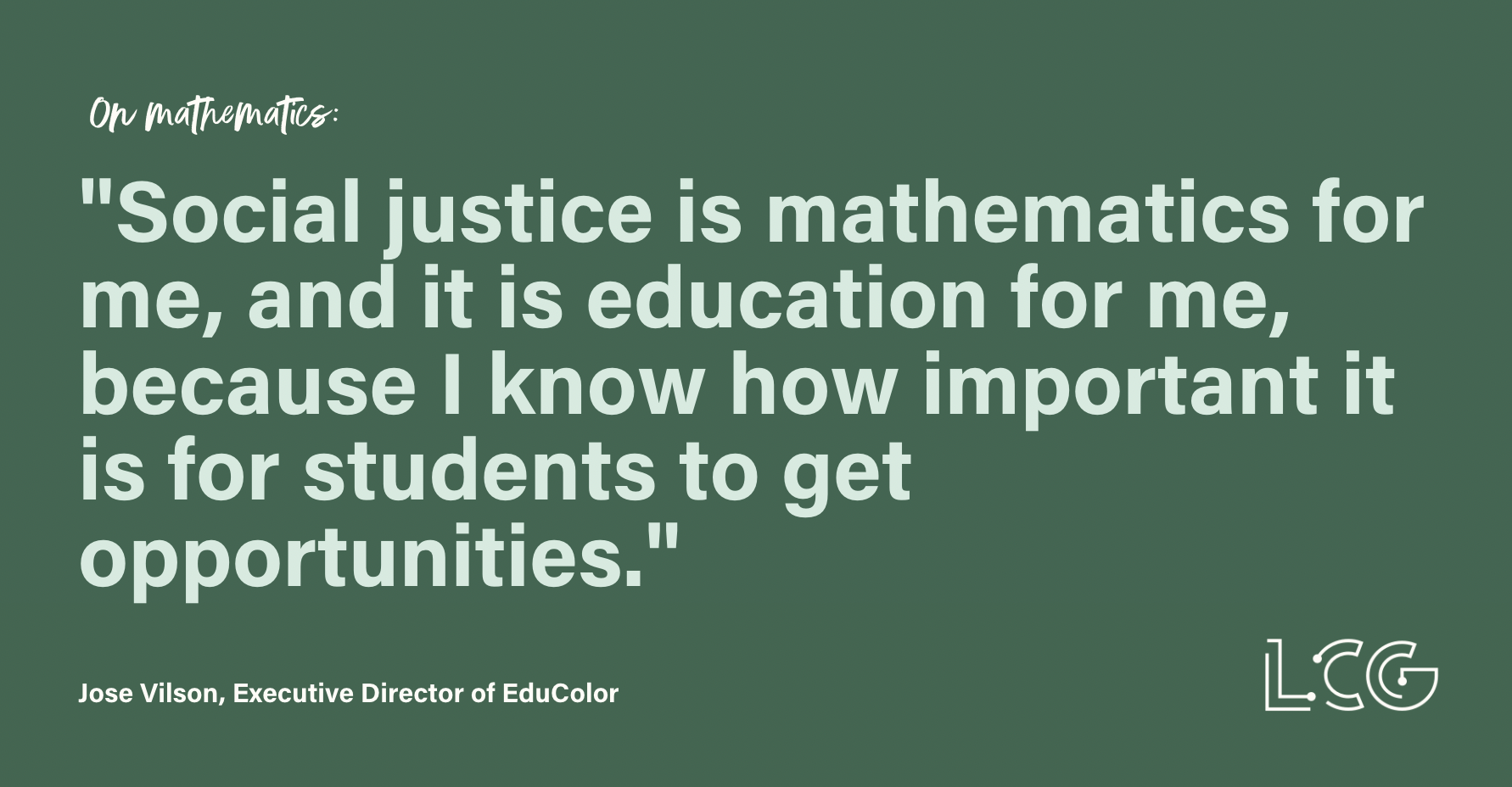When it comes to walking the talk of equity in education, it's hard to find a better example than José Vilson. He's a math teacher and coach; a speaker, activist, and author; and the executive director of EduColor. Elana Leoni, CEO of Leoni Consulting Group, sits down with José for a lively discussion about mathematics as a key to social justice; the stories that people need to tell, hear, and read; and what's possible in education when everyone's humanity counts.
"I Am Going To Become Who I Actually Am."
José's multicultural upbringing on Manhattan's Lower East Side, along with his undergraduate work in computer science at Syracuse University, shaped his interest in servant leadership for students who didn't share his advantages. He recalls thinking:
"If I'm going to affect high school dropout rates, then I need to go back and catch them in the middle grades so that they can have a strong foundation in math. Social justice is mathematics for me, and it is education for me, because I knew how important it was for students to get opportunities."
Years of teaching math, blogging, and thought leadership about education, and browsing for the book that still hadn't been published led José to write This Is Not A Test: A New Narrative on Race, Class and Education.
"This is written for educators, but it's also written for the general public to get a lens of what educators can and should do with their voice. If I interject a bit of who I am and why I do what I do, then maybe other people can follow that path."
Difficult Conversations Are Often Important Conversations
José believes that building classroom relationships starts with being authentic toward students as people and, as he puts it, "bringing my lived experience into the things that I'm doing." When kids are upset about real-world events, he can see it in their faces:
"There were some days where we literally went half the class just talking about the thing. They weren't trying to intentionally get away from the work. It was more like this was a tension, and no one else was going to name it except for the person they feel like they trusted the most, and that was me."
With so many other educators sharing similar experiences, the logical next step was the EduColor movement, a forum for difficult conversations that no other education communities were having at the time. José describes the framework:
"It's being able to say, 'Let's name the pain, let's name who's affected, let's talk about the messaging, and then how are we going to have conversations with the key stakeholders, especially the folks who are most affected, and then try to build out from there?'"
As more communities begin to explore cultural pain points, EduColor may have been critical to that evolution.
Make The Most Of Everyone's Linguistic Gifts
Growing up in a bilingual family and studying the language of mathematics through the lens of computer science, José is attuned to the challenges and opportunities facing English-language learners in New York City, where he lives and teaches. From this perspective, he gladly offers some advice to EdTech companies:
"EdTech can be helpful in trying to ensure that teachers can actually tap into students' languages because, as we know from the research, if we can actually teach students in their home language the math that they need, then they'll be able to pick it up in English pretty quickly once they get strong at that mathematical component."
Going beyond language, José also sees EdTech as an easy way to address students with disabilities or who are "quasi-abled." He adds:
"That spectrum is worth discussing, because it helps everybody get acclimated to what's happening, and the more tools, the better for everybody."
Here's the full transcript of José’s podcast episode.
Resources Mentioned in this Episode:
All Things EduColor
EduColor, José serves as executive director of this nationwide movement, launched in 2014 to mobilize advocates around issues of educational equity, agency, and justice
EduColor Summit, an annual event of sharing and learning now open to the public
Organizations
National Board Certification, the most respected professional certification available in education
National Board for Professional Teaching Standards, the organization supporting the National Board Certification; José currently sits on the Board of Directors
Math for America, a nonprofit professional development organization for math teachers; José is certified as a Master Teacher
PowerMyLearning, a nonprofit advancing educational equity and accelerating student success; José currently sits on the Board of Directors
EduMatch, online community connecting educators with similar passions and interests; Elana mentions this as an organization founded by previous podcast guest Sarah Thomas (Inequities Exposed During the Pandemic: A Conversation With Sarah Thomas)
Fight for $15, a global organization advocating for union rights and workplace equity, launched in NYC at the time that José was first considering EduColor
Black Lives Matter Movement, a Black-centered political will and movement-building project, gaining national momentum at the time that José was first considering EduColor
The Expectations Project, EduColor has partnered with this advocacy group for people of faith
Center for American Progress, EduColor has partnered with this independent, nonpartisan policy institute dedicated to progressive ideas and strong leadership
Books and TV
The First Five: A Love Letter to Teachers by Patrick Harris II, a memoir about starting a teaching career; José likes his approach of discussing a profession via personal narrative
Not Light, But Fire: How to Lead Meaningful Race Conversations in the Classroom by Matthew R. Kay, a book supporting José’s view that an educational setting is ideal for inviting students to have difficult conversations
Abbott Elementary, a mockumentary TV series that José credits for pushing public education into the mainstream
All Things José
This Is Not A Test: A New Narrative on Race, Class and Education, José's book
TED, featuring José speaking about his book and EduColor
Edutopia, José blogged extensively for this platform from 2012-2016
Teachers College at Columbia University, José is currently enrolled in this doctoral program
Elana Leoni, Host
Elana Leoni has dedicated the majority of her career to improving K-12 education. Prior to founding LCG, she spent eight years leading the marketing and community strategy for the George Lucas Educational Foundation where she grew Edutopia’s social media presence exponentially to reach over 20 million education change-makers every month.
José Vilson, Guest
José Luis Vilson is a veteran educator, writer, speaker, and activist in New York City, NY. He is the author of This Is Not A Test: A New Narrative on Race, Class, and Education. He has spoken about education, math, and race for a number of organizations and publications, including the New York Times, The Guardian, TED, El Diario/La Prensa, and The Atlantic. José is a National Board Certified Teacher, a Math for America Master Teacher, and the executive director of EduColor, an organization dedicated to race and social justice issues in education. He is currently a doctoral student in sociology and education at Teachers College, Columbia University. He is now on the board of directors for the National Board of Professional Teaching Standards and PowerMyLearning.
About All Things Marketing and Education
What if marketing was judged solely by the level of value it brings to its audience? Welcome to All Things Marketing and Education, a podcast that lives at the intersection of marketing and you guessed it, education. Each week, Elana Leoni, CEO of Leoni Consulting Group, highlights innovative social media marketing, community-building, and content marketing strategies that can significantly increase reach, relationships, and revenue.
Rate, Like, and Subscribe
Let us know what you thought about this episode by rating and reviewing our podcast. Click here, scroll to the bottom, tap to rate with five stars, and select “Write a Review.” Then be sure to let us know what you loved most about the episode! Also, if you haven’t done so already, subscribe to the podcast to be notified when we have more content to share with you.





